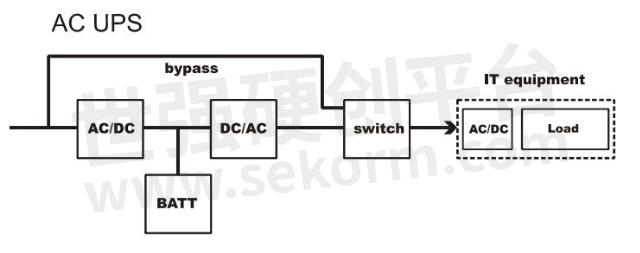DC UPS vs AC UPS: What’s the Difference?

Uninterruptible Power Supplies (UPS) play a crucial role in ensuring a continuous and reliable power supply for critical electronic devices. When it comes to UPS systems, there are two primary types: DC UPS and AC UPS. In this article, we will explore the key differences between DC UPS and AC UPS, shedding light on the concepts of AC and DC in UPS, their respective functionalities, and how they impact your power protection needs.
What is AC and DC in UPS?
AC (Alternating Current) and DC (Direct Current) refer to the two main types of electric current. AC is characterized by a flow of electric charge that periodically reverses direction, while DC maintains a consistent flow in a single direction. In the context of UPS, these terms are associated with the type of electrical power the UPS system utilizes. AC is the standard form of power from the electrical grid, while DC is used for storing power in batteries within the UPS.
What does DC UPS mean?
A DC UPS is a type of uninterruptible power supply system that utilizes direct current (DC) as its primary source of electrical power. In a DC UPS, the incoming power is already in the form of DC, and it is used to charge a battery or a bank of batteries. When a power interruption occurs, the DC power stored in the batteries is directly supplied to the connected devices, ensuring a seamless and uninterrupted power flow. DC UPS systems are commonly employed in applications where DC power is the preferred or readily available source.

Fig.1
What is DC voltage in UPS?
The DC voltage in a UPS refers to the level of electric potential difference in the DC power supplied by the UPS system. In a UPS, the DC voltage is a critical parameter as it determines the amount of electrical potential available to charge and store energy in the batteries. Common DC voltage levels for UPS systems include 12V, 24V, 48V, and 120V, although other voltages are also possible depending on the design and specifications of the UPS. The choice of DC voltage depends on factors such as the capacity of the UPS, the size of the connected load, and the design considerations of the overall power protection system.
What does AC UPS mean?
An AC UPS is a type of UPS system that utilizes AC as its primary source of electrical power. In an AC UPS, the incoming AC power is typically rectified to DC to charge a battery or a bank of batteries. During a power outage or disturbance, the stored DC power is then inverted back into AC power to provide a continuous and uninterrupted power supply to connected devices. The primary function of an AC UPS is to ensure a seamless power transition during electrical disruptions, protecting sensitive electronic equipment from power fluctuations, outages, and voltage irregularities.

Fig.2
What is the difference between AC UPS and DC UPS?
The primary difference between AC UPS and DC UPS lies in the type of electrical current they use and the way they handle power during normal operation and outages. Here are the key distinctions between the two:
Type of Power Input
AC UPS: Accepts and uses AC as the input power source. The incoming AC power is typically rectified to DC for charging the internal batteries.
DC UPS: Operates directly with DC power. The incoming power is already in the form of DC, and it is used to charge the batteries. During an outage, the DC power stored in the batteries is directly supplied to the connected devices.
Conversion Process
AC UPS: Involves two conversions - from AC to DC during normal operation for battery charging, and from DC back to AC during a power outage to supply power to connected devices.
DC UPS: Operates without the need for AC to DC conversion during normal operation. The DC power is stored and supplied directly to the load during an outage.
Applications
AC UPS: Ideal for applications where the majority of devices operate on AC power and where seamless transition during power outages is crucial. Commonly used in a wide range of applications, including data centers, computer systems, and other devices that typically require AC power.
DC UPS: Suited for applications where DC-powered devices are prevalent or where a simpler power supply system is desired. Suited for applications where DC power is preferred or readily available, such as in telecommunications systems, certain industrial control systems, and specific medical equipment.
Complexity and Cost
AC UPS: Typically more complex due to the need for an inverter for AC to DC conversion and a rectifier for DC to AC conversion. This can lead to higher upfront costs.
DC UPS: Simpler design as it operates directly with DC power, potentially resulting in lower costs.
Can UPS convert DC to AC?
Most UPS systems are equipped with an inverter that can convert DC power stored in batteries to AC power during an outage. The inverter in a UPS is a crucial component that performs the conversion from DC to AC. This capability allows UPS systems to protect electronic equipment, such as computers, servers, and other critical devices that require AC power. The ability to convert DC to AC is a key feature of a UPS, ensuring uninterrupted power delivery during outages and fluctuations in the main power source.
Conclusion
In conclusion, understanding the differences between DC UPS and AC UPS is essential for selecting the right power protection solution for your specific needs. Whether you require a UPS system that directly utilizes DC power or one that converts DC to AC, the choice depends on the nature of your equipment and its power requirements. Both AC and DC UPS systems serve the critical function of ensuring uninterrupted power, safeguarding sensitive electronics from potential damage during power disruptions. As a global leader in lithium battery cell manufacturing, Grepow offers professional customization solutions for 12V and 24V UPS batteries and Battery Management Systems (BMS), catering to your specific application requirements.
- +1 Like
- Add to Favorites
Recommend
- What Is a UPS Battery?
- UPS Battery Market Forecast Research Report
- What Is UPS Battery Backup?
- 12V UPS Battery FAQs
- Shorter-Than-Expected UPS Battery Life Increases Maintenance Burden
- Frequently Asked Questions for UPS Battery Replacement
- 5 Advantages of Lithium-Ion Battery Operated UPS SANUPS E11B-Li
- SANYO DENKI‘s UPS with Automatic Battery Self Test to Ensure Reliable Power
This document is provided by Sekorm Platform for VIP exclusive service. The copyright is owned by Sekorm. Without authorization, any medias, websites or individual are not allowed to reprint. When authorizing the reprint, the link of www.sekorm.com must be indicated.





























































































































































































































































































































































































































































































































































































































































































































































































































































































